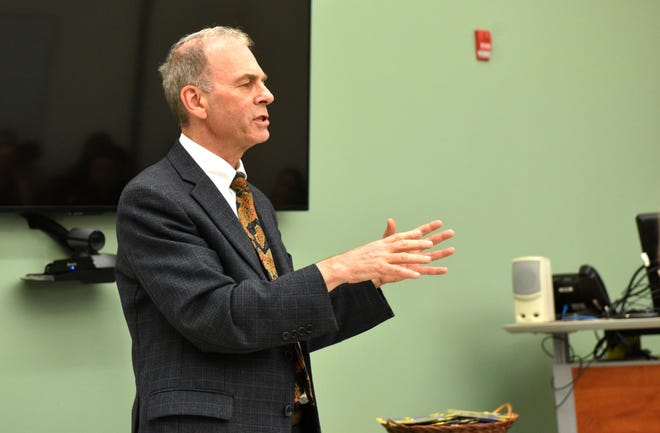Bucks County biotechnology center fosters innovations aimed at the pandemic
Doylestown, Dec. 18, 2020 - In the global fight against the coronavirus pandemic, local scientists working in Bucks County, Pennsylvania, know even the smallest contributions make a real difference.
Timothy Block, co-founder, president and CEO of the Pennsylvania Biotechnology Center, the Hepatitis B Foundation and the Baruch S. Blumberg Institute, said that while their community of scientists is small, they’ve made significant accomplishments and progress in the past several months.
“There’s a massive international effort right now to address the problem of COVID-19 vaccinations and treatments and testing and every aspect. It’s really something the world has never seen — this kind of coming together,” said Block.
“We’re one small part of it, but it certainly makes me feel good that we are making a contribution,” he added.
At the Blumberg Institute, which manages the Pennsylvania Biotechnology Center in Buckingham, Block said they remain committed to their mission of finding cures for chronic hepatitis B and liver cancer, but have discovered ways in which their current technologies could prove valuable in the management of COVID-19.

Working with drugs that have already been proven to be safe and effective gives researchers a head start by turning what would normally take several years to conduct a study into mere months — a significant advantage when, during a pandemic, timing is critical.
With that in mind, Block zeroed in on a drug developed by his colleagues at the University of Oxford that was ultimately approved for treating rare genetic diseases.
His decades-long study of this family of drugs, called iminosugars, led his team at the Blumberg Institute to reason these drugs would work alone or in combination with the antiviral drugs Remdesivir and Favipiravir. They partnered with Susan Weiss, a professor at the University of Pennsylvania, to test their hypotheses.
“All of this work is very preclinical, which means we have no information about human studies with COVID-19 and these drugs, but we are encouraged. There is still quite a ways to go, but it will be a shorter path than if we were starting with entirely new, never tested in people, drugs,” said Block.
In another project, Dr. Richard Pestell, professor and president of the Pennsylvania Cancer and Regenerative Medicine Research Center at the Blumberg Institute, is focused on COVID-19 and the role of SARS-CoV-2 in heart disease and cardiovascular problems, which is now known to be an increasingly common and serious problem.
Using a technology known as digital spatial profiling, they have been defining the local inflammation and genetic signaling pathways activated in the heart of patients affected by SARS-CoV-2, Pestell said. The mechanisms and the pathways they have identified by which SARS-CoV-2 affects the heart may have direct clinical implications.
While working with existing technologies is meaningful in treating patients quickly, Block points out it is rarely as effective as treatments that are purpose-driven, or created specifically to target a certain disease.
John Kulp, the Blumberg Institute’s director of the Center for Bioinformatics and Computational Chemistry, and Usha Viswanathan, a Blumberg Institute assistant professor, have discovered a potential direct-acting antiviral.
Using computational analysis, the team worked to develop a drug designed specifically to target SARS-CoV-2, said Block.
“They got to work on it as soon as the structure of the SARS-CoV-2 proteins were published. That shows you the value of public information and people collaborating,” Block said.
While the need for direct-acting antivirals is apparent, the current pandemic further highlights the need for broad-spectrum antiviral treatments, which target multiple viruses behind one common disease — a mission one local company was built around.
At Evrys Bio in Doylestown, Lillian Chiang, president and CEO, and her team are developing an antiviral drug to treat respiratory infections caused by several viruses, including influenza strains and coronavirus. The program is in its preclinical stage, with testing underway to determine its effectiveness against SARS-CoV-2.
Additionally, FlowMetric Life Sciences, Inc. and Serologix, two companies at the Pennsylvania Biotechnology Center, have partnered to deploy some of the first COVID-19 tests in the region and continue to innovate new assays, said Block.
“This represents some of the collaborations that occur between the startup companies here and the nonprofits, such as Blumberg and the Hepatitis B Foundation,” he added. “I’m very proud of the fact we have companies here that are actually delivering useful products that we, in the area, are using.”
Block said Bucks County is fortunate to have “an extremely robust knowledge-community of scientists” conducting “state-of-the-art, cutting-edge research” right in its own backyard.
“It is impressive and reassuring to see so many talented people and companies spring to action to do whatever they can to help reduce the damage inflicted on us all by the coronavirus pandemic,” said Block. “It is particularly meaningful that there are so many resources here at the Center, and in Bucks County, that can be applied to the cause of defeating this pandemic.”
Learn more about the Bucks County, Pennsylvania, region by visiting visitbuckscounty.com.
Click here for source.
